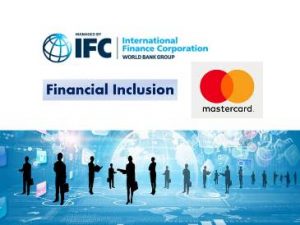 Mastercard and IFC, a member of the World Bank Group, today bolstered their partnership to drive financial inclusion, updating a $250 million global risk-sharing facility to expand access to electronic payments in emerging markets.
Mastercard and IFC, a member of the World Bank Group, today bolstered their partnership to drive financial inclusion, updating a $250 million global risk-sharing facility to expand access to electronic payments in emerging markets.
Electronic payments help underserved people and small businesses more fully participate in the formal economy. Yet, financial institutions in emerging markets often have difficulty covering their transaction settlement obligations, making it harder to rapidly scale financial services where they are needed most.
Updating an agreement originally signed in 2015, the revised agreement between IFC and Mastercard helps financial institutions in developing countries participate in the Mastercard network more effectively through a program in which IFC will guarantee up to 100 percent of the settlement risk. The new agreement will support a major expansion of the program to more participating banks and financial institutions.
Stephanie von Friedeburg, IFC chief operating officer said, “This partnership will help bring modern financial services to underserved people around the world. It allows us to pool our capabilities in risk management and financial technologies, and to leverage our global network of financial institutions to deliver financial inclusion.”
With the revised agreement, Mastercard will extend its efforts to identify, develop and implement programs with participating financial institutions. This will improve access to electronic payments for millions of people in emerging markets. The company will also continue to support a separate 2016 agreement with IFC to increase acceptance of electronic payments among small businesses and micro entrepreneurs in the same markets.
“True inclusion is not something any one entity can deliver on its own,” said Michael Froman, vice chairman and president, strategic growth at Mastercard. “It’s partnerships like this, combined with technology and know-how, that are truly driving greater inclusion in emerging markets. The programs the facility is developing around the world are vital to bringing people and communities into the financial system and on a path to prosperity.”
Mastercard’s broader work with the World Bank Group is helping to increase universal financial access by 2020. In 2015, the company committed to reach 500 million people previously excluded from financial services within five years. Today, the company has connected more than 330 million people around the world through programs like the Mastercard-IFC public-private partnership, with more to come.
About IFC
IFC—a sister organization of the World Bank and member of the World Bank Group—is the largest global development institution focused on the private sector in emerging markets. We work with more than 2,000 businesses worldwide, using our capital, expertise, and influence to create markets and opportunities in the toughest areas of the world. In FY17, we delivered a record $19.3 billion in long-term financing for developing countries, leveraging the power of the private sector to help end poverty and boost shared prosperity. For more information, visit www.ifc.org.
About Mastercard
Mastercard (NYSE: MA), www.mastercard.com, is a technology company in the global payments industry. Our global payments processing network connects consumers, financial institutions, merchants, governments and businesses in more than 210 countries and territories. Mastercard products and solutions make everyday commerce activities – such as shopping, traveling, running a business and managing finances – easier, more secure and more efficient for everyone. Follow us on Twitter @MastercardNews, join the discussion on the Beyond the Transaction Blog and subscribe for the latest news on the Engagement Bureau.
Source: IFC Press Release






















